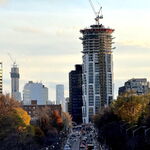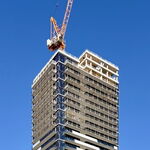Tewder
Senior Member
The criticisms in this article are legitimate, but they don't have anything much to do with the character of the two cities or their governments. The difference in urban planing is mostly due to geography. Vancouver is surrounded by water on three sides, and you hit mountains and wilderness parks if you go much further. Toronto on three sides is surrounded by flat rolling fields that present no real barrier to development.
I see that the signs announcing 'Green Belt' keep being pushed back. Darn right there's something our governments can do about this. Lots can be done to encourage, indeed legislate, density including funding commitments to mass transit, among other things. Still, cheerleaders like Oliver Tweed are happy they get to live downtown and go clubbing! For them everything is perfect as long as there are really tall, cool buildings being built.







